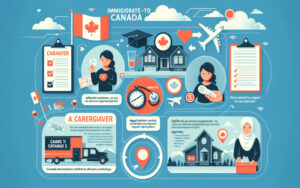Migrating to Canada through the Express Entry system is a popular option for skilled immigrants seeking new opportunities and a better quality of life. Launched in 2015, Express Entry is an online immigration application system designed to fast-track the permanent residency process for skilled workers. This system ranks candidates based on a Comprehensive Ranking System (CRS) and invites the highest-ranking individuals to apply for permanent residency and enjoy the benefits of living and working in Canada.

The first step to participate in the Express Entry system is to understand eligibility requirements and evaluate your chances under different programs like Federal Skilled Worker Program, Federal Skilled Trades Program, or Canadian Experience Class. Once you know the program you qualify for, create an Express Entry profile while including details related to age, education, language skills, work experience, and other relevant information.
As you move through the Express Entry process, you will aim to maximize your CRS score to improve your chances of receiving an invitation to apply for permanent residency. After receiving an Invitation to Apply (ITA), it is crucial to submit all required documents and forms on time. Once you achieve permanent residency status, you can eventually apply for Canadian citizenship and fully integrate into Canadian society.
Key Takeaways
- Understand eligibility and choose the right Express Entry program.
- Create an Express Entry profile with accurate information to maximize your CRS score.
- Act promptly after receiving an Invitation to Apply and work toward permanent residence and eventual citizenship.
Understanding Express Entry and Eligibility

Express Entry is an online application system through which skilled workers can apply for Canadian permanent residence. The programs under Express Entry are designed to attract skilled immigrants who can contribute to the country’s economic growth. In this section, we’ll explore the primary programs and their eligibility criteria.
Federal Skilled Worker Program (FSWP)
The Federal Skilled Worker Program is designed for skilled workers with experience in one of the eligible National Occupational Classification (NOC) codes. To qualify, applicants must have:
- At least 1 year of continuous, full-time (or equivalent part-time) skilled work experience in the past 10 years
- A minimum of Canadian Language Benchmark (CLB) 7 for English or Niveaux de compétence linguistique canadiens (NCLC) 7 for French in all four categories (reading, writing, listening, and speaking)
- A valid Educational Credential Assessment (ECA) report for a foreign diploma, certificate, or credential
Canadian Experience Class (CEC)
Canadian Experience Class aims to provide a pathway to permanent residence for skilled workers who have gained valuable work experience in Canada. Eligibility criteria include:
- At least 1 year of full-time (or equivalent part-time) skilled work experience in Canada within the last 3 years
- NOC code 0, A, or B for the work performed in Canada
- Minimum language proficiency levels of CLB 5/7 for NOC B, or CLB 7/9 for NOC 0 and A
Federal Skilled Trades Program (FSTP)
The Federal Skilled Trades Program caters to tradespersons with experience in specific skilled trades. To be eligible, applicants must:
- Showcase at least 2 years of full-time work experience in a skilled trade within the past 5 years
- Have a valid job offer of full-time employment for a minimum of 1 year or hold a Canadian trade certificate or qualification
- Meet minimum language proficiency levels of CLB 5 for speaking and listening, and CLB 4 for reading and writing
Comprehensive Ranking System (CRS)
The Comprehensive Ranking System is the points-based system used to assess and score Express Entry candidates. It considers factors such as:
- Age
- Education
- Language proficiency
- Work experience
- Arranged employment
- Adaptability (e.g., having a spouse or common-law partner in Canada)
- Provincial nominations
We recommend checking your CRS score before creating an Express Entry profile, as it impacts your chances of receiving an Invitation to Apply (ITA) for permanent residency.
Creating an Express Entry Profile

Required Documentation
Before starting the process, it’s essential to gather all necessary documents. This will help us to ensure a smooth and accurate completion of the Express Entry profile. Some of the critical documents required are:
- Passport or travel document
- Proof of work experience, such as reference letters from previous employers
- Valid job offer (if applicable)
- Proof of funds to support ourselves in Canada
It’s a good idea to gather and scan all these documents beforehand, as we will need to upload them at various stages of the application process.
Educational Credential Assessment (ECA)
If we completed our education outside of Canada, we would need an Educational Credential Assessment (ECA). The ECA evaluates the equivalence of our educational credentials to Canadian standards, which is crucial for eligibility in Express Entry programs. There are designated organizations, like World Education Services, that can provide ECAs for immigration purposes. Be sure to allocate enough time to obtain the ECA, as it may take several weeks to receive the report.
Language Proficiency Tests
A key requirement for the Express Entry profile is demonstrating language proficiency in either English or French. We must take a designated language test and obtain a minimum language score corresponding to the Canadian Language Benchmark (CLB) or Niveaux de compétence linguistique canadiens (NCLC) levels.
For English proficiency, we can take either the IELTS (International English Language Testing System) or the CELPIP (Canadian English Language Proficiency Index Program) tests. For French proficiency, the TCF (Test de Connaissance du Français) is accepted.
Once we have all the required documentation, ECA, and language test results, we can create a GCKEY Account and begin filling out our Express Entry profile. It is essential to provide accurate information and submit the profile within the 60-day period after receiving an Invitation to Apply (ITA) if we are eligible.
Improving Your CRS Score
One of the key aspects to successfully migrate to Canada using the Express Entry system is to achieve a high Comprehensive Ranking System (CRS) score. Your CRS score is what determines your ranking within the Express Entry pool, and ultimately influences your chances of receiving an Invitation to Apply (ITA) for permanent residence. In this section, we will discuss some ways to improve your CRS score through obtaining additional points for job offers, enhancing education and language proficiency, and utilizing Provincial Nominee Programs (PNP).
Additional Points for Job Offers
Receiving a valid job offer from a Canadian employer can significantly boost your CRS score. For most skilled workers, the score can increase by 50 points or up to 200 points for managerial-level positions (NOC 00). It’s important to note that the job must be full-time, non-seasonal, and for a duration of at least one year.
To increase your chances of receiving a job offer, we recommend:
- Expanding your professional network in Canada
- Creating a strong resume tailored to the Canadian job market
- Actively searching for jobs on various platforms, such as Job Bank, and private job boards
Education and Language Proficiency
Upgrading your education credentials and improving your language skills can also have a positive effect on your CRS score:
1. Canadian Education: If you complete your education at a Canadian institution, you can gain extra points to improve your CRS score. Obtaining a Canadian degree, diploma, or certificate can add up to 30 points to your score, depending on the level of education attained.
2. Language Proficiency: Bilingualism in both English and French or merely improving your language skills in either language can add significant points to your CRS score. Proficiency is measured through the Canadian Language Benchmark (CLB) for English and the Niveaux de compétence linguistique canadiens (NCLC) for French. Higher language test scores can result in more points added to your CRS score.
Provincial Nominee Programs (PNP)
Applying for a Provincial Nominee Program is another way to increase your CRS score. Upon receiving a provincial nomination, 600 points are added to your CRS score, which greatly increases your chances of receiving an invitation to apply for Canadian permanent resident status.
Here are some popular PNP streams related to Express Entry:
- Human Capital Priorities Stream (OINP): The Ontario Immigrant Nominee Program provides an opportunity for individuals with work experience in specific occupations, including STEM and healthcare fields, to receive an invitation for provincial nomination.
- Skilled Trades: Many provinces have specific PNP streams targeting skilled tradespersons, such as electricians, plumbers, and welders. These programs prioritize applicants with relevant skills and experience in high-demand trades occupations.
- STEM Occupations & Healthcare Occupations: Some provinces target candidates in science, technology, engineering, and mathematics (STEM) occupations or healthcare professions due to their importance in the regional labor market.
By exploring these options and focusing on improving your CRS score in the areas mentioned, you can increase your chances of successfully migrating to Canada through the Express Entry system.
After Receiving Invitation to Apply (ITA)
Completing the Permanent Resident Application
Upon receiving an Invitation to Apply (ITA), we must first complete our application for Permanent Residence (PR) online through the Express Entry system. It is essential to gather all required documents and information necessary for the Electronic Application for Permanent Residence (eAPR).
We need to provide accurate, detailed, and up-to-date information. One important aspect of the eAPR is providing documentation that demonstrates our work experience, education, language proficiency, and other qualifications relevant for the particular program. Additionally, it’s crucial to double-check every piece of information before submitting the eAPR, as errors can lead to delays or even refusals.
Fees and Proof of Settlement Funds
When submitting our Permanent Resident application, we are required to pay various fees, such as the biometric fee and the application processing fee. This is necessary regardless of our age and whether we’ve previously given biometrics.
Moreover, we must provide proof of funds for our settlement in Canada. Depending on the number of family members, the required amount may vary. The following table illustrates the necessary funds for different family sizes:
| Number of Family Members | Required Funds (in CAD) |
|---|---|
| 1 | 12,960 |
| 2 | 16,135 |
| 3 | 19,836 |
| 4 | 24,083 |
| 5 | 27,315 |
| 6 | 30,806 |
| 7 or more | 34,299 |
It is vital to submit proof of funds to show we can financially support ourselves and any accompanying family members upon arrival in Canada. This documentation might include bank statements, investment or property titles, or other financial assets.
Lastly, we must also be prepared to pay the Permanent Resident fee upon approval of our application. This fee is essential for securing our status as Permanent Residents in Canada.
RELATED: How to Move to Canada Without IELTS: A Comprehensive Guide
Beyond Express Entry: PR and Citizenship
Permanent Resident Card
The journey to Canadian citizenship begins with obtaining a Permanent Resident Card. This essential document authenticates your permanent resident status in Canada. Even if you immigrate through the Express Entry system, you’ll still need a Permanent Resident Card.
Processing times for Permanent Resident Cards vary and can change depending on several factors, including the amount of applications received and the complexity of your specific situation. Generally, processing times range from three to six months.
It’s important to note that Express Entry Draws are a crucial factor in your immigration journey. These are conducted periodically to select the highest-ranking candidates in the pool based on the Comprehensive Ranking System score. High-ranking candidates are then invited to apply for permanent residence.
Exploring Canadian Citizenship
Once you hold a Permanent Resident Card and meet specific residency requirements, you may be eligible to apply for Canadian citizenship. Here are the essential steps to become a Canadian citizen:
- Meet the residency requirements: In the last 5 years, you must have lived in Canada as a permanent resident for at least 1,095 days.
- Pass the knowledge test: Applicants between 18 and 54 years old are required to pass a test on Canadian history and politics.
- Prove language proficiency: Demonstrating fluency in either English or French (Canada’s official languages) is a must.
- Paying the application fees: The current fees for applying for citizenship, including the processing fee and the right of citizenship fee, is 630 CAD.
In conclusion, obtaining a Permanent Resident Card is a crucial step before exploring Canadian Citizenship. Keep in mind the different factors such as processing times and Express Entry Draws when planning your immigration journey.
Disclaimer:
This article is for informational purposes only and not financial advice. Please do your own research or consult a professional before making financial decisions. The writer and publisher bear no responsibility for any potential losses or damages. Any reliance you place on information from canadaeasily.com is strictly at your own risk. Please read our Terms of Service for more information.




